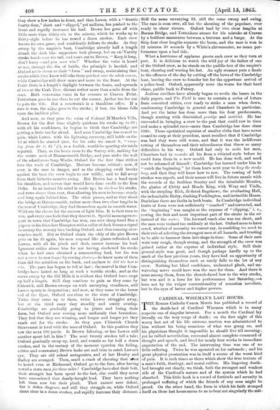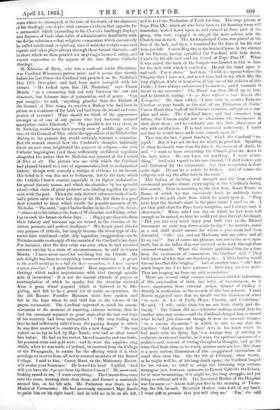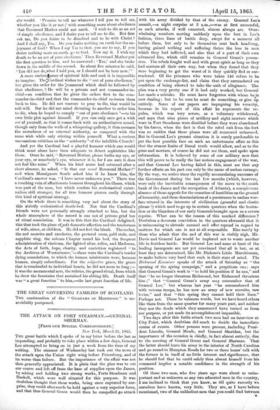CARDINAL WISEMAN'S LAST HOURS.
THE Roman Catholic Canon Morris has published a record of the death-bed of Cardinal Wiseman which is in many respects one of singular interest. For a month the Cardinal lay literally on the very verge of death ; on the first night of this weary last act of his life extreme unction was administered to him without his being conscious of what was going on, and his physicians thought it impossible he should live till morning; yet he rallied nevertheless, recovered almost complete command of thought and speech, and lived for nearly four weeks in immediate expectation of the end.. The intervening time was one of no little suffering. Twice he was operated on for carbuncle ; and his great physical prostration was in itself a source of the worst kind of pain. It is such times as these which show the true texture of a man's faith, theology, and moral calibre. His lingering death- bed brought out clearly, we think, both the strongest and weakest side of the Cardinal's nature and of the system which he had absorbed. This little book is a record of fortitude and serenity in prolonged • suffering of which the friends of any man might be Proud. On the other hand, the form in which his faith stamped itself on those last hours seems to us to bear out singularly the esti-
mate which we attempted, at the time of his death, of the character of his theology, —to depict with curious vividness that appetite for a ceremonial which (according to his Church's teaching) displays and disposes of God.—that habit of administrative familiarity with the divine substance—that religious communion which can scarcely be called intellectual or spiritual, since it waits for certain concerted signals and takes place always through these formal channels,—all in short which we then pointed out as giving a bronzed, sultry, and vacant expression to the aspects of the true Roman Catholic theology.
St. Nicholas of Myra, who was a confessor under Diocletian, was Cardinal Wiseman's patron saint, and it seems that shortly before his last illness the Cardinal had preached on St. Nicholas's Day (6th December) and had been much occupied with his -virtues. " He looked upon him (St. Nicholas)," says Canon Morris, " as a connecting link not only between the east and the.west, but between days of persecution and of peace. Can you imagine,' he said, anything grander than the Fathers of the Council of Nice rising to receive a Bishop who had been in prison as a confessor of the faith and had been the friend and com- panion of martyrs? What should we think of the appearance amongst us of one of our priests who had narrowly escaped martyrdom under Elizabeth?' " The parallel is not very close, as St. Nicholas would have been scarcely even of middle age at the time of the Council of Nice, while the appearance of an Elizabethan Bishop in the present day would certainly warrant a sensation. But the remark showed how the Cardinal's thoughts habitually dwelt on and even heightened the pageant of religion,—for even Catholic hagiologists (and those sufficiently credulous) repudiate altogether the notion that St. Nicholas was present at the Council of Nice at all. The picture was one with which the Cardinal had pleased himself as a sort of representative link in ecclesiastical history, though with scarcely a vestige of evidence in its favour. His belief in it was due not to testimony, but to the taste which the Catholic Church creates, especially in its higher ecclesiastics, for grand historic scenes, and which she cherishes by her splendid ritual—that chain of great pictorial acts binding together the pre- sent with the past. This is the only distinct reference to the Cardi- nal's patron saint in these last days of his life, but there is a good • deal recorded in them which recalls the popular accounts of St. Nicholas. " The saint," says Charles Butler, in his Lives of the Saints, " observed in his infancy the fasts of Wednesday and Friday, refus- ing to suck the breast on those days . . . Happy are theywho from their infancy and innocent age are inured to the exercise of de- votion, penance, and perfect obedience !" We do not quote this for any purpose of ridicule, but simply because the ritual type of cha- racter here attributed—with silly legendary exaggeration—to St. Nicholas marks so strongly all the records of the Cardinal's last days. For instance, after the first crisis was over, when he had received extreme unction in a state of unconsciousness, he said to Canon Morris, "I have never cared for anything but the Church. My sole delight has been in everything connected with her. As people in the world would go to a ball for their recreation, so I have enjoyed 4a great function." A great function ! How expressive it is of the theology which makes acquaintance with God through specific -acts of invocation ! It is not the mental attitude of prayer or contemplation of which he speaks, but the stimulus received from a great ritual pageant which is believed to be life- giving, and felt to be a grand act of social co-operation. So the old Roman Pontifex Maximus must have spoken and felt in the time when he still held fast to the virtues of the pagan ceremonial. The Cardinal regretted so much his uucon- sciousness at the moment of receiving extreme unction, that he had the ceremony repeated in great state after the last real hope -of his recovery had been relinquished. His own feeling was that he had sufficiently rallied from the passing danger in which he was first anointed to constitute this a new danger." "He was vested, as he lay in bed, by Mgr. Searle, who had so often vested him before. He had on his rochet, his red mozzetta and zucchetto, his pectoral cross and gold stole ; and he wore the sapphire ring -which, when he was made a Cardinal, he received from the College of the Propaganda, in return for the offering which it is their privilege to receive from all newly-created members of the Sacred College. I said to him, ' Canon Hunt, as the Missionary Rector, will anoint your Eminence.' He bowed his head. I added, And will you have the Asperges from the Senior Canon ?' He answered, looking round at me, I want everything.' The Canons then came into the room, wearing their choir dress, and formed a semicircle around him, on his left aide. Mr. Patterson was there, as his Master of Ceremonies. He had previously requested Mgr. Searle to assist him on his right hand ; and he told me to be on his left, and to read the Profession of Faith for him. The large picture of Pope Pius IX., which all who have been in his drawing-room will remember, looked down upon us, and seemed to form part of the group, who were engaged in one.of the most solemn acts the Church has devised. The Archiepiscopal Cross was placed at the foot of the bed, and there it remained for the days of his life that were yet left. Canon Maguire, as the Senior Canon, in the absence of the Provost, having sprinkled the Cardinal with holy water, I knelt by his side and read the Creed of Pope Pius IV. When it was ended, the book of the Gospels was handed to him to kiss, for the oath with which it concludes. He put his hand upon it, and said, ' Put it down.' And then, ' I wish to express before the Chapter that I have not, and never have had in my whole life, the very slightest doubt or hesitation of any one of the articles of this Faith ; I have always endeavoured to teach it ; and I transmit it intact to my successor.' The Missal was then lifted up to him, and he kissed it, saying, ' Sic me Deus adjure: et haec Sancta Dei Evangelic.' He then added, ' I now wish to receive Extreme Unction at your hands, as the seal of my Profession of Faith.' Canon Hunt then took off his Canon's mozzetta, and put on a sur- plice and stole. The Cardinal knew, and had remarked long before, that Canons ought not to administer the Sacraments in their choir dress ; and he evidently saw this little observance of rule with satisfaction. If he had recovered sufficiently, I doubt not that he would have made some remark upon it."
That was the last "great function" which the Cardinal "en- joyed." But it was not the last for which he provided. Speaking of what he should wish done for him in the moment of death, he said, " I want to have everything the Church gives me, down to the holy water. Do not leave out anything. I want every- thing." And with regard to his own funeral, "I shall look to you and Patterson for the ceremonial. See that everything is done quite right. Do not let a rubric be broken. And of course the religious will say the office here in the room."
This feeling of deriving real strength and life from external ceremonial pervades almost every saying of the Cardinal's during this month. Even in recurring to the view from Monte Porzio in Rome, of which he was excessively fond, he suddenly turns from it to the gold chair from which he gazed upon it. " They have kept the Rector's chair in the place where I used to sit. I got that gold chair for Pope Leo's reception, and I always used it afterwards." When asked one day on which he had been well enough to be moved, so that he could just pass through his chapel, "Did you not very much enjoy your little visit to the Blessed Sacrament on your way down-stairs to-day ?" he answers, much as a sick child would answer for whom a play-room had been decorated, " Oh ! yes, and my Madonna, and my relics, and all lit up too !" But of course his pleasure was not in the mere spec- tacle, but in the influx of power received, as he held, through these external channels. When the doctors prohibited him for a time from the excitement of communion, the Cardinal said, " They little know of what they are depriving me. A little fasting would tire me less than this longing." And at another time, " Oh ! how much longer am I to have patience ? How long am I to wait? They are keeping me from my only consolation."
There are several other curious and almost childish indications of this externalism of faith, this habit of breathing-in, as it were, inspiration from external action, instead of finding it directly in meditation, in the records of this last sickness. Canon Morris suggested once that he should use his clearness of mind " to make the Acts of Faith, Hope, Charity, and Contrition." He said, "I will ; make them for me out loud, slowly and dis- tinctly." The Canon did so,—whatever making mental Acts for another man may mean,—and the Cardinal charged him to record what he had just done—as though it were an external ritual-
" in a solemn document," in which he was to say that the Cardinal "had always had those Acts in his heart which he had made with his dying lips,"—a strange way of striving to sculpture in external marble, as it were, the spiritual egotisms of a prelate's soul, instead of letting thoughts be thoughts, and go for what God finds them to be worth, neither more nor less. But there is a more curious illustration of this exaggerated externalism of creed than even this. On the 9th of February, when weary, as he might well be, of his long death agony, the Cardinal longed for his release, he tried to adopt the following very curious stratagem (not, however, unknown to Roman Catholic tradition), for at once terminating, if it might be, the long struggle, and yet
doing so without self-will. The Reverend Mother of the Hospital was his nurse :—" About half-past five in the morning of Thurs- day, the 9th, he said, Reverend Mother, take hold of my hand. I want yolk to promise that you will obey me.' ' Yes,' she said
she would. ' Promise to tell me whatever I tell you to tell me, whether you like it or not ;' with something more about obedience that Reverend Mother could not catch. I wish to die as an act of simple obedience, and I desire you to tell me to die. But first ask me, Do you desire to be dissolved and to be with Christ ? And I shall say, Yes. Do you desire nothing on earth but the en- joyment of God? When I say Yea to that, you are to say, If you desire nothing more on earth, go to God. Now say it. I wish my death to be an act of pure obedience.' Then Reverend Mother put the first question to him, and he answered : ' Yes,' and she broke down in the middle of the second. In about five minutes he said, You did not do,what I told you, or I should not be here now."
A more curiousjgame of spiritual hide and seek it is impossible to imagine. The:Cardinal wishes to die " out of pure obedience," but gives the order for the ;command which shall be followed by that obedience:1 He will be a private and not commander-in- chief—on condition that he gives the orders first to the com- mander-in-chief and,that the commander-in-chief re-issues them back to him. He did not venture to pray to die, that would be self-will. But he did not mind dictating to another to order him to die, when he hoped to comply " out of pure obedience '—to his own little plot against himself. If you can only once get a wish out of yourself, so that it comes back with an authoritative sound, though only from the walls of a whispering-gallery, it thus assumes the sacredness of an external authority, as compared with the same wish while only stirring within yourself. What a curious unconscious criticism on the " authority " of the infallible Church !
And yet the Cardinal had a playful humour which one would think must alone have been adequate to detect sophistries like these. Once he said, " Reverend Mother, please bathe my eye, or your eye, or somebody's eye, whosever it is, for I am sure it does not feel like mine." When his kind nurse had returned after a short absence, he asked, "Is that our usual Reverend Mother ?" and when Monsignore Searle asked him if he knew him, the Cardinal's answer was, " I have never unknown you." There was a touching vein of affectionate humour throughout his illness, which was part of the man, but which renders his ecclesiastical exter- nalism still stranger, for all true humour pierces easily through this kind of spiritual strategy.
On the whole there is something very sad about the story of this strictly ecclesiastical death-bed. Not that the Cardinal's friends were not personally strongly attached to him, but the whole atmosphere of the record is one not of private grief but of ritual consolation. It was in this that the Cardinal delighted, this that took the place ofsoft domestic affection and the tenderness of wife, sister, or children. He did not feel the blank. The rochet, the red mozetta and zucchetto, the pectoral cross, gold stole, and sapphire ring, the solemn Chapter round his bed, the frequent administration of viaticum, the lighted altar, relics, and Madonna, the Acts of faith, hope, charity, and contrition registered " in the Archives of Westminster,"—these were the Cardinal's tender dying consolations, to which the human ministrants were, because human, simply subordinate. For the subjective grace, the grace that is vouchsafed to individual hearts, he did not seem to long ;— it was the sacramental acts, the rubrics, the grand ritual, from which he drew the fountains that sustained his ebbing life. Death itself was " a great function " to him,—the last great function of life.
































 Previous page
Previous page